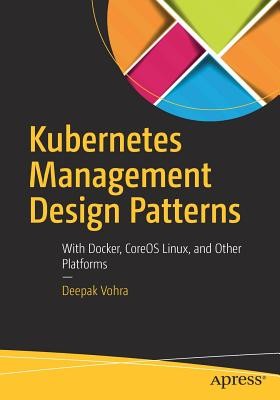
- We will send in 10–14 business days.
- Author: Deepak Vohra
- Publisher: Apress
- ISBN-10: 148422597X
- ISBN-13: 9781484225974
- Format: 17.8 x 25.4 x 2.2 cm, softcover
- Language: English
- SAVE -10% with code: EXTRA
Reviews
Description
Take container cluster management to the next level; learn how to administer and configure Kubernetes on CoreOS; and apply suitable management design patterns such as Configmaps, Autoscaling, elastic resource usage, and high availability. Some of the other features discussed are logging, scheduling, rolling updates, volumes, service types, and multiple cloud provider zones. The atomic unit of modular container service in Kubernetes is a Pod, which is a group of containers with a common filesystem and networking. The Kubernetes Pod abstraction enables design patterns for containerized applications similar to object-oriented design patterns. Containers provide some of the same benefits as software objects such as modularity or packaging, abstraction, and reuse.
CoreOS Linux is used in the majority of the chapters and other platforms discussed are CentOS with OpenShift, Debian 8 (jessie) on AWS, and Debian 7 for Google Container Engine.
CoreOS is the main focus becayse Docker is pre-installed on CoreOS out-of-the-box. CoreOS:
- Supports most cloud providers (including Amazon AWS EC2 and Google Cloud Platform) and virtualization platforms (such as VMWare and VirtualBox)
- Provides Cloud-Config for declaratively configuring for OS items such as network configuration (flannel), storage (etcd), and user accounts
- Provides a production-level infrastructure for containerized applications including automation, security, and scalability
- Leads the drive for container industry standards and founded appc
- Provides the most advanced container registry, Quay
What You'll Learn
- Use Kubernetes with Docker
- Create a Kubernetes cluster on CoreOS on AWS
- Apply cluster management design patterns
- Use multiple cloud provider zones
- Work with Kubernetes and tools like Ansible
- Discover the Kubernetes-based PaaS platform OpenShift
- Create a high availability website
- Build a high availability Kubernetes master cluster
- Use volumes, configmaps, services, autoscaling, and rolling updates
- Manage compute resources
- Configure logging and scheduling
Who This Book Is For
Linux admins, CoreOS admins, application developers, and container as a service (CAAS) developers. Some pre-requisite knowledge of Linux and Docker is required. Introductory knowledge of Kubernetes is required such as creating a cluster, creating a Pod, creating a service, and creating and scaling a replication controller. For introductory Docker and Kubernetes information, refer to Pro Docker (Apress) and Kubernetes Microservices with Docker (Apress). Some pre-requisite knowledge about using Amazon Web Services (AWS) EC2, CloudFormation, and VPC is also required.
EXTRA 10 % discount with code: EXTRA
The promotion ends in 19d.13:41:45
The discount code is valid when purchasing from 10 €. Discounts do not stack.
- Author: Deepak Vohra
- Publisher: Apress
- ISBN-10: 148422597X
- ISBN-13: 9781484225974
- Format: 17.8 x 25.4 x 2.2 cm, softcover
- Language: English English
Take container cluster management to the next level; learn how to administer and configure Kubernetes on CoreOS; and apply suitable management design patterns such as Configmaps, Autoscaling, elastic resource usage, and high availability. Some of the other features discussed are logging, scheduling, rolling updates, volumes, service types, and multiple cloud provider zones. The atomic unit of modular container service in Kubernetes is a Pod, which is a group of containers with a common filesystem and networking. The Kubernetes Pod abstraction enables design patterns for containerized applications similar to object-oriented design patterns. Containers provide some of the same benefits as software objects such as modularity or packaging, abstraction, and reuse.
CoreOS Linux is used in the majority of the chapters and other platforms discussed are CentOS with OpenShift, Debian 8 (jessie) on AWS, and Debian 7 for Google Container Engine.
CoreOS is the main focus becayse Docker is pre-installed on CoreOS out-of-the-box. CoreOS:
- Supports most cloud providers (including Amazon AWS EC2 and Google Cloud Platform) and virtualization platforms (such as VMWare and VirtualBox)
- Provides Cloud-Config for declaratively configuring for OS items such as network configuration (flannel), storage (etcd), and user accounts
- Provides a production-level infrastructure for containerized applications including automation, security, and scalability
- Leads the drive for container industry standards and founded appc
- Provides the most advanced container registry, Quay
What You'll Learn
- Use Kubernetes with Docker
- Create a Kubernetes cluster on CoreOS on AWS
- Apply cluster management design patterns
- Use multiple cloud provider zones
- Work with Kubernetes and tools like Ansible
- Discover the Kubernetes-based PaaS platform OpenShift
- Create a high availability website
- Build a high availability Kubernetes master cluster
- Use volumes, configmaps, services, autoscaling, and rolling updates
- Manage compute resources
- Configure logging and scheduling
Who This Book Is For
Linux admins, CoreOS admins, application developers, and container as a service (CAAS) developers. Some pre-requisite knowledge of Linux and Docker is required. Introductory knowledge of Kubernetes is required such as creating a cluster, creating a Pod, creating a service, and creating and scaling a replication controller. For introductory Docker and Kubernetes information, refer to Pro Docker (Apress) and Kubernetes Microservices with Docker (Apress). Some pre-requisite knowledge about using Amazon Web Services (AWS) EC2, CloudFormation, and VPC is also required.


Reviews